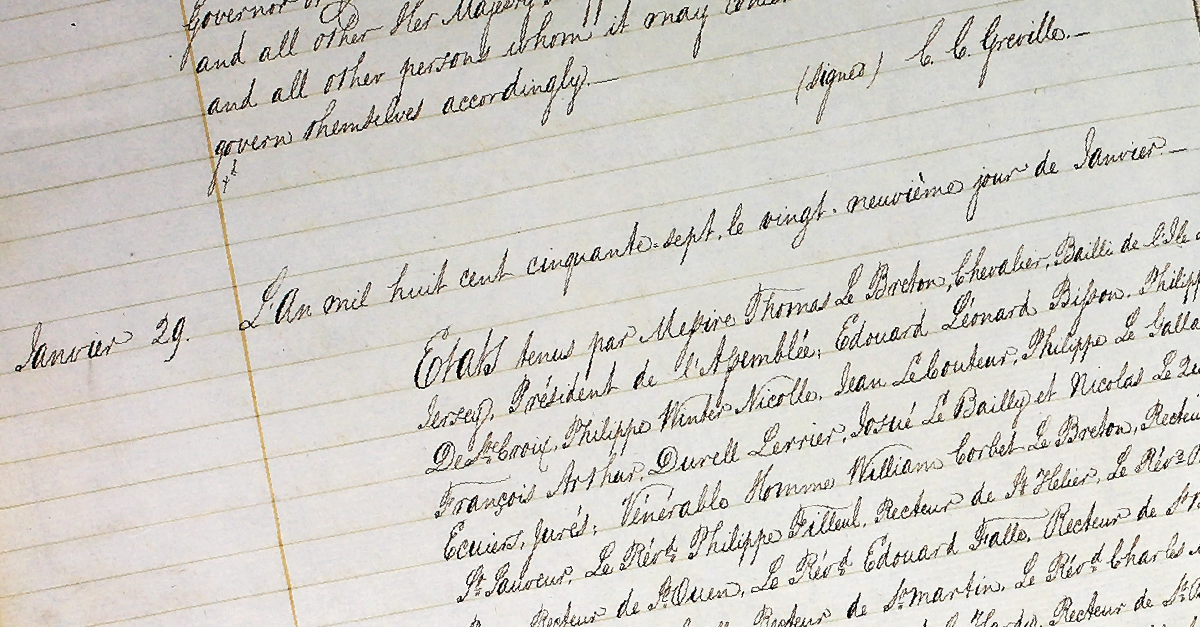
29 January 2025
At present, Deputies make up the majority of the States Assembly – representing 37 of the 49 seats within the Chamber.
But that has not always been the case, with the position of Deputy only being agreed by Members in the November of 1856, and the first States sitting with Deputies present being held on this day the following year.
Prior to that, the Assembly was made up of Jurats and Rectors, as well as the 12 Parish Constables – who have been Members of the States for at least 500 years, since our States meeting records began.
Creation of the office of Deputy
During the States sitting on 6 November 1856, the Assembly made changes to the law to create the new Deputy positions, set the voting rights and obligations of the office and made changes to the Island’s electoral legislation. Some of the decisions passed in that sitting are still in place today, albeit with tweaks to reflect the Island’s growing population.
It was agreed that each of the Island’s 12 Parishes would have a single Deputy seat – with the exception of St Helier, which would have three. It was also decided that those wishing to stand for Deputy would have to be at least 20 years old and that elections for those seats would “take place every three years, on the second or third Tuesday of the month of January”.
Those successfully elected would be required to swear an oath of office – the wording of which remains the same to this day.
The oath states: 'You swear and promise before God that you will well and faithfully discharge the duties of Deputy; that you will be faithful and bear true allegiance to His Majesty King Charles the Third, his heirs and successors, according to Law; that you will uphold and maintain the laws, privileges, liberties and franchises of Jersey, opposing whomsoever may wish to infringe the same; that you will attend the meetings of the States whenever you are called upon to do so; and generally that you will fulfil all the duties imposed upon you by virtue of the said office. All of which you promise to do on your conscience.'
Provisions were also made for by-elections to be held in the event of the death of a Deputy and it was also proscribed that Members of the Royal Court, including the Attorney General and Viscount could not be Deputies.
The first ever States sitting with Deputies
Deputies were welcomed to the Chamber for the first time with a lengthy sitting. According to the 1857 Minutes, topics focussed on gunpowder regulation for the Island’s cannons, cargo limits and rules for boats, taxation and drainage in and around Gorey.
Another of the main talking points from that 1857 States sitting was the Island’s coast – seen by many as the jewel in Jersey’s crown. In order to prevent damage to the beaches, the Assembly – in the wake of coastal erosion – moved to block the removal of sand, stone and other potential building materials from the coast.
The Minutes state that: ‘The sea has caused great devastation on various points of the coasts of this Island, and that the transport of stone, sand, clay, pebble, shingle or gravel from these parts of the coasts could cause serious inconveniences, the States in view to prevent this evil in the future, have resolved to defend it, therefore it is expressly forbidden to take or carry away stone, sand, gravel, pebble, or shingle, clay or loam.’
Further changes to the office of Deputy
The responsibilities of Deputies have remained largely the same since that 1856 meeting which established the office and the number of seats stayed at 14 until the early 20th century, when St Helier was split into three electoral districts each comprising two Deputy seats, giving the Island’s capital six Deputy representatives in total.
Major constitutional reforms in 1948 further increased the allocation within the Chamber, as more seats were put in place for the urban areas – specifically St Saviour and St Brelade, while St Helier’s number of representatives was again boosted.
And the number of Deputies landed at its current number of 37 ahead of the most recent General Election in 2022, when the electoral boundary lines were redrawn to create nine new constituencies each represented by either three, four or five Deputies.
